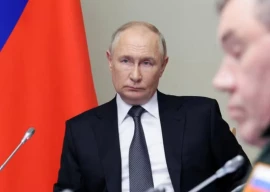
In all, 2,002 members of the international forces have been killed since the US-led invasion in 2001, including 1,226 Americans, 331 from Britain and 445 from other nations making up the coalition, the independent website said.
So far this year, 434 foreign troops have been killed, compared with a peak of 521 in 2009, it said. The latest death was reported on Saturday, with an Australian commando shot dead by insurgents. There are currently more than 140,000 US and NATO-led troops in Afghanistan aiming to flush out remnants of the hardline Taliban, who went on the offensive after being toppled from government in the 2001 invasion.
Last week, the United Nations said the number of civilian casualties in the Afghan war had risen sharply in the first six months of this year, most of them as a result of insurgent attacks. It said 1,271 ordinary Afghans were killed in the first half and another 1,997 wounded.
In a US television interview on Sunday, the US commander in Afghanistan, General David Petraeus, said he would not be bound by a July 2011 deadline to begin withdrawing US troops. Petraeus, who took over command of foreign forces last month, said President Barack Obama's date for the start of a limited US withdrawal was not set in stone and should be viewed more as an attempt to increase the urgency of the counter-insurgency effort.
"I think the president has been quite clear in explaining that it's a process, not an event, and that it's conditions-based," Petraeus told NBC television's "Meet the Press".
US reinforcements are trying to drive back Taliban insurgents in the south with the last units of a 30,000-strong surge of troops due to swell American numbers to 100,000 in the coming weeks. Obama has been strongly criticised for saying US troops will start coming home in mid-2011.
Opponents say it sends out the message America is not in the fight for the long-term and adds to the Taliban's resolve to wait it out. With the help of its Western backers, the Afghan government is trying to build up its army and police so that they can take responsibility for security from US-led NATO forces by 2014. The Taliban still control large swathes of the south -- where the insurgency is at its most intense -- and have put up stiff resistance to a surge of foreign troops as part of a counter-insurgency strategy.

















COMMENTS
Comments are moderated and generally will be posted if they are on-topic and not abusive.
For more information, please see our Comments FAQ